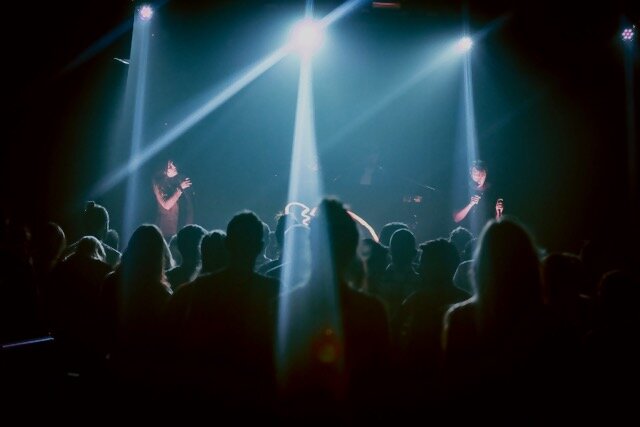
Can Music Make You Sick?
Measuring the Price of Musical Ambition
Sally Anne Gross and George Musgrave present
The largest ever study into mental health in the music industry.
Now extended into a book by industry veteran turned academic Sally Anne Gross and musician and lecturer George Musgrave, Can Music Make You Sick? takes an even deeper dive into the lived experiences of musicians in the modern day industry, using empirical research and interviews to challenge myths and demonstrate how the industry’s often unstable working conditions provide the ‘perfect storm’ to foster or even amplify mental health struggles in music creators, raising uncomfortable truths to challenge a sector that is seemingly ripe for change.

The life of musicians has often been perceived through an idealistic lens, a ‘pleasure dome’ of self-actualisation and glamour, but paradoxically it can be inhabited by musicians who are struggling with psychological, economic and addiction difficulties. Amy Winehouse’s death in July 2011 was a significant moment in the consciousness of the British music industry. In the years that followed, there have been various revelations from musicians about their mental health struggles, from Ed Sheeran and Stormzy, to Adele and Justin Bieber. There have also been the shocking and tragic suicides of Keith Flint, DJ Avicii and others - all of which have challenged the romanticised myth around the allure of being a musician.
Music makers are three times more likely to experience anxiety and/or depression than the general public.
In 2016 and 2018, Help Musicians UK, Music Tank and the University of Westminster commissioned Gross and Musgrave to conduct a wide-ranging study of over 2000 music makers to discover their lived experiences and working conditions. The findings which received global media attention were staggering.
71.1% of respondents reported high rates of anxiety and 68.5% reported depression.
Written over four years, Gross and Musgrave have extended their research independently into book form, now published by University Of Westminster Press. Through listening to how musicians understand and experience their working lives, the book turns on its head the notion that musicians are themselves prone to mental health problems. While conceding that the creation and consumption of music might be therapeutic, it could be the actual pursuit of a career in music that undermines and destabilises a musician’s wellbeing.

“Singing is crying for grown-ups. To create great songs or play them with meaning music's creators reach far into emotion and fragility seeking the communion we demand of it. However, music’s toll on musicians can leave deep scars. In this important book, Sally Anne Gross and George Musgrave investigate the relationship between the wellbeing music brings to society and the wellbeing of those who create. It’s a much needed reality check, de-glamorising the romantic image of the tortured artist.”
— Crispin Hunt, Multi-Platinum Songwriter/Record Producer, Chair of the Ivors Academy.
Through multiple interviews with musicians, Gross and Musgrave break their findings down into three different themes
Status of Work
Financial precarity due to the self-employed and freelance nature of being a musician, and difficulty in being able to define success, leads musicians to question whether what they do is ‘work’ or a ‘career’. Financial challenges also prevent musicians accessing adequate wellbeing support and causes anxiety about their futures – something which the coronavirus has brought into sharp focus.
Status of Value
As traditional markers of career success are elusive, and musicians connect their identity to their ability to create, musicians turn to a transactional digital community of fans, artists and industry representatives where their wellbeing is often undermined. Additionally, chasing the markers of status, such as record contracts, often relies on privilege and the right network connections, as opposed to simply ‘hard work’ and ‘luck’.
Status of Relationships
Anti-social working hours, touring schedules, and an ‘always on’ mentality driven by an oversupply of music and a lack of boundaries, leads to musicians struggling to know when to stop working, which can cause isolation and prevent them from being able to build and maintain meaningful relationships.

The book also highlights the key challenges faced by women musicians who are experiencing inequality of access to a career and unfair treatment such as discrimination and sexual harassment – shockingly in a recent Musician’s Union survey 50% of women had experienced sexual harassment in the music industry, and 85% did not report it.
This book encourages discussion and raises difficult questions about what the industry needs to do to affect transformative change, and what best practice needs to be implemented to best support and care for music creators, begging the question; ‘Are we churning out too many musicians for the industry to manage?’
Music is a source of pleasure, joy, meaning and fulfilment, and the type of work many aspire to with an all consuming passion. However, what does this research tell us about its costs? Is the price of musical ambition simply too high?

More Information
Please contact Vikki Scott or Indy Vidyalankara
Reviews
“Musicians often pay a high price for sharing their art with us. Underneath the glow of success can often lie loneliness and exhaustion, not to mention the basic struggles of paying the rent or buying food. Sally Anne Gross and George Musgrave raise important questions – and we need to listen to what the musicians have to tell us about their working conditions and their mental health.”
— Emma Warren, Music Journalist and Author
“This book should be mandatory reading for every label, booking agent, manager and tour manager in the business of music and touring so we can all better understand what’s really involved in living the life of a professional musician and the role we all have in making that life as liveable as possible”
— Grant Hutchison (Frightened Rabbit)
“The best guide to what being a musician, and what ‘the music industry’ actually are that I can remember reading… it manages to capture and quantify so much about how we value emotion, creativity, labour, relationships, time, other people, [and] ourselves, in the information economy”
— Joe Muggs, DJ, Promoter, Journalist (The Guardian, Telegraph, FACT, Mixmag, The Wire)
“Singing is crying for grown-ups. To create great songs or play them with meaning its creators reach far into emotion and fragility seeking the communion we demand of music. The world loves music for bridging those lines. However, music’s toll on musicians can leave deep scars. In this important book, Sally Anne Gross and George Musgrave investigate the relationship between the wellbeing music brings to society and the wellbeing of those who create. It’s a much needed reality check, deglamourising the romantic image of the tortured artist.”
— Crispin Hunt, Multi-Platinum Songwriter/Record Producer, Chair of the Ivors Academy
“A critical and timely book which is sure to kick start further conversations around musicians, mental health and the music industry”
— Adam Ficek, Psychotherapist [Music and Mind]/BabyShambles
A Collaborative Effort
Can Music Make You Sick?
is a collaboration between Sally Anne Gross and George Musgrave.
cover image courtesy of RITUAL © 2019, photographed by Jackson Ducasse © 2019
Can Music Make You Sick? copyright © 2020 University of Westminster Press.
















